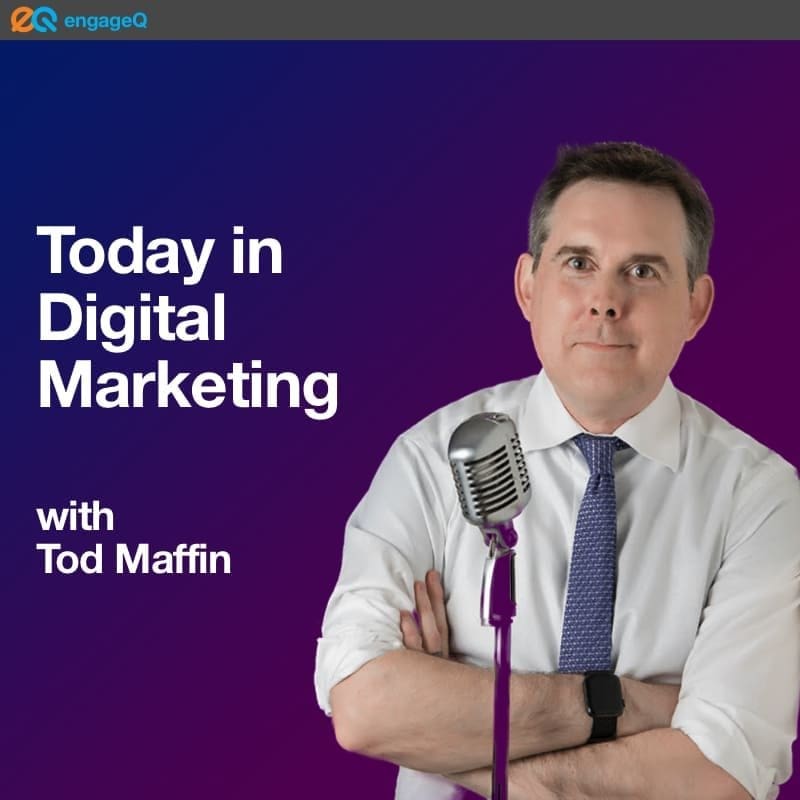Advertise • The Podcast • Our Social Media
Did AI Write This Newsletter Title?
Marketers are using generative AI for more of their work — but can consumers tell the difference? And which version do they prefer? You might be surprised.
by Tod Maffin (LinkedIn • all social media)
Reach 4,000+ marketing decision-makers for just $7!
More Info • Contact Us
Today's News:
AI • Can Consumers Tell You Used GenAI?
META ADS • “Engaged Customers” Custom Audience
VERTICAL VIDEO • LinkedIn to Try Its Hand. Again.
RETAIL • Amazon Dropping “Just Walk Out” Tech
MARKET RESEARCH • Focus Group by AI Avatar?
PRIVACY • Google to Delete Private Browsing Data
Generate more repeat purchases with Black Crow AI
Black Crow AI helps merchants recognize 100% of returning users and predicts shopping behavior patterns so you can effortlessly acquire more sales.
Their Shopify app plugs into your tech stack with zero development work required. And everything is set up for you to see clear incremental revenue so you can judge the value for yourself during a 30-day free trial.
Their team is so confident you’ll see 5-8X ROI that they’re offering a $100 Amazon gift card to Shopify brands with $2M+ in annual revenue just to get a demo.
AI • Can Consumers Tell You Used GenAI?
Let’s face it — it’s a compelling argument: Get AI to write our ad copy. It’s faster, it’s easier to scale, and it’s much cheaper than a human.
But can consumers tell that you took the lazy way out?
That’s what Bynder, a digital asset management company, set out to discover.
They gave AI this prompt: “Write 300 words on how to clean your car.'“ Then, they game the same instruction to a human copywriter. And they showed both versions to 2,000 consumers.
And the results — a crapshoot.
Exactly 50% of consumers could tell that the copy had been generated by AI.
Millennials could spot the fake copy the best — previous research has found that group to also be the most likely to use AI tools for content generation.
The study tested this against both US and UK consumers — Americans were about 10% more likely to spot AI copy than their British counterparts.
As for which of the two versions people preferred: 56% picked the AI-generated article. This was the same for all age groups, except for one — and if you think it’s the Boomers, you’re wrong. In fact, people aged 16-24 were the only cohort to prefer the human-written content, though the margin was only 55% to 45%.
This tested a full blog post, remember. My guess is that far fewer people would be able to figure out whether AI wrote a smaller chunk of content, like a product description or a headline.
Today’s Trivia — Guess and Win!
Each month, we pick someone who guesses in a trivia question and comp them the Premium Newsletter! Just click on any option below:
META ADS • “Engaged Customers” Custom Audience
One of the unfortunate byproducts of the ad platforms’ obsession with jamming AI into all parts of the media buying process, is that as they add AI, invariably, they remove direct control. You only have to compare what a Google ad campaign looked like five years ago, to a Performance Max campaign today to see the levers which have been removed.
But one interesting trend in the last half-year or so is the same platforms returning some of those levers.
Last week, Meta rolled out a new targeting option to its Advantage+ Shopping Campaigns: Engaged Customers.
And while this sounds like an auto-generated cohort, in fact it’s basically just a new spot for a custom audience.
To use the Engaged Customers Audience Segment, you give Meta one or more of your existing custom audience groups that you feel represent your best prospects — perhaps past shoppers, or people who viewed a product more than three times but haven’t bought yet.
And there’s reporting to go along with it, under the Breakdown menu and “Demographics by Audience Segments,” you’ll now see a way to view by New Customers, Existing Customers, and Engaged Customers.
VERTICAL VIDEO • LinkedIn to Try Its Hand. Again.
Stop me if you’ve heard this one before — “hell, even LinkedIn is going full vertical now!”
Yes, the business-focused social network is trying its hand at the vertical video format, with a dedicated video feed in the app.
And yes, it looks pretty much identical to TikTok, right down to the placements of the four icons on the right side of the screen — a format which everyone else, like YouTube and Instagram, also copied.
This is only in a small test group for now, but that test does give this feed its own button on the bottom row. Tapping on that button gives you basically the TikTok experience.
If this all sounds familiar, it’s because four years ago, LinkedIn tried to copy the Stories format which, at the time, had started to pick up steam. Then, less than a year later, it announced it was dropping the format. T
he same thing happened with Twitter around the same time, which called its posts there “Fleets.”
I, for one, can’t wait for the thousands of hustle-bro information marketing webinar pitches.
No word on when this will roll out to everyone, but you know it will, and probably soon.
RETAIL • Amazon Dropping “Just Walk Out” Tech
One thing that is not rolling out, surprisingly, is Amazon’s much ballyhooed “Just Walk Out” technology.
We saw this in some of their concept grocery stores — cameras and sensors in the ceiling tracked what people put in their carts, so they just had to walk out and they’d be charged for the products automatically. No cashier, no self-serve checkout kiosk.
Except it turns out, it was a lot less automated than we all originally thought. The Information reported that “the system relied on more than 1,000 people in India watching and labeling videos to ensure accurate checkouts.”
So while it got a lot of media attention, and half their Amazon Fresh stores used the technology, today, a company executive told media they would be mostly walking away from the technology.
There will still some places the Just Walk Out technology will still work — they’re keeping it around in a few stores in the U.K. They just added it to some ballparks in the U.S., and no word on whether those will stay in place.
But not to fear… Enter Dash Carts, stage left.
Dash Carts are Amazon’s new play — shopping carts with a screen and product scanner attached, which let you scan products as you shop. As long as you have an Amazon account, of course. If you don’t, you’ll be relegated to a self-checkout kiosk. Will that lineup be the green text bubble of the grocery world?
/boosts
MARKET RESEARCH • Focus Group by AI Avatar?
Focus group testing has been a mainstay of the market research world for generations. It’s helped brands figure out what their logo should look like, what products to drop, and so on.
But sometimes, it’s hard to ask the tough questions — so now, some agencies are asking AI to sit in the chairs instead of people.
As for how accurate the responses are, one recent study found that data from AI subjects were about 75% to 90% on point with what human subjects would say.
Supernatural says it’s also using AI as focus group subjects for products around women’s health and fertility.
PRIVACY • Google to Delete Private Browsing Data
And finally, as part of a legal settlement, Google has agreed to delete web browsing data it collected from users while they browsed in incognito mode.
In related news… Google collected web browsing data from us while we browsed in incognito mode!
And the reason was because of course they did. Google’s web browser is and has always been a Machiavellianly brilliant trojan horse. Less about providing the world with a safe and fast browser; more about being able to see where everyone goes on the web and what they do there.
It’s the same thing Facebook did when they bought a VPN service, then made it free, and recommended people use it — you know, for safety. Nevermind that Zuckerberg was collecting reams of data on what you did off his platform. Safety, I tell you.
The legal settlement stemmed from a lawsuit [PDF] filed four years ago by three Chrome users.
Google called the lawsuit “meritless” and said “We are happy to delete old technical data that was never associated with an individual and was never used for any form of personalization.”
But that doesn’t quite square with the effort the company spent defending itself against the lawsuit — at one point submitting 4,500 pages in an argument to try to get the case dismissed. That attempt, of course, failed.
Internal communication revealed through discovery found Google employees called Chrome’s Incognito Mode ‘misleading,' ‘effectively a lie,' and ‘a problem of professional ethics and basic honesty,' according to a plaintiff declaration [PDF].
In the end, on the eve the trial, the parties settled. In addition to deleting the user data it had collected and kept, the settlement requires Google to inform users what data it collects on what you do and where you go — even in private browsing mode.














